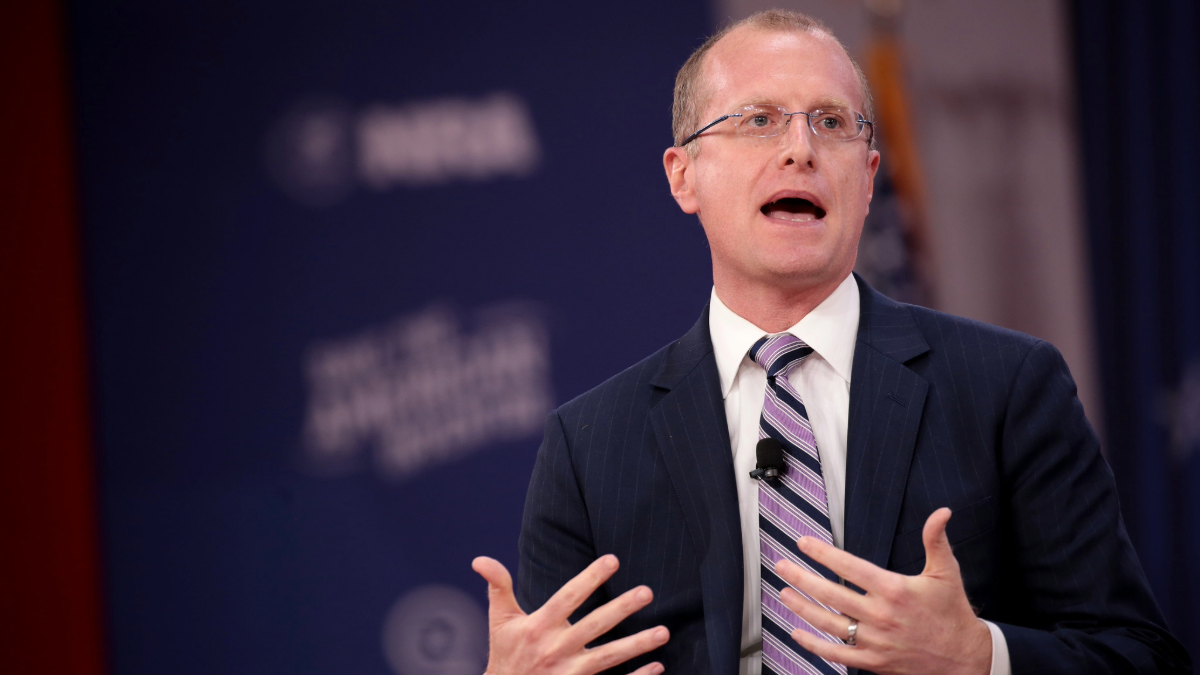November 2024 US Tech Policy Roundup
J.J. Tolentino, Rachel Lau, Ben Lennett, Gabby Miller, Prithvi Iyer / Dec 2, 2024
FCC Commissioner Brendan Carr speaking at the 2018 Conservative Political Action Conference. (Photo by Gage Skidmore)
Rachel Lau and J.J. Tolentino work with leading public interest foundations and nonprofits on technology policy issues at Freedman Consulting, LLC. Ben Lennett is the managing editor of Tech Policy Press, Gabby Miller is the staff writer at Tech Policy Press, and Prithvi Iyer is the program manager at Tech Policy Press.
Now that the 2024 election is complete, we have a somewhat clearer picture of the US tech policy landscape for 2025. President-elect Donald Trump’s victory could portend significant changes to tech policy on a number of critical issues, including artificial intelligence, cryptocurrency, and privacy. Republicans also flipped the Senate, selecting Sen. John Thune from South Dakota as their new majority leader. Sen. Thune’s tech policy record stretches back more than a decade, particularly around telecommunication issues, including broadband. The Republican majority in the Senate also means that Sen. Ted Cruz (R-TX) will likely take over as chair of the Senate Committee on Commerce, Science, and Transportation.
President-elect Trump has also announced a number of nominees for positions with relevance to tech policy, including Sen. Marco Rubio (R-FL) for Secretary of State, who has oversight of the Department of State’s internet freedom initiatives, and Wall Street CEO Howard Lutnick to lead the Commerce Department, which includes the National Telecommunications Information Administration (NTIA) and National Institute of Standards (NIST). Trump also tapped current Republican Commissioner Brendan Carr to become Chairman of the Federal Communications Commission (FCC).
Despite a focus on the transition to the next administration and Congress, the current Congress may still take up some bills on artificial intelligence and other matters before the year is up. The Biden administration was also rushing to complete some remaining business before its term is up in January, including finalizing $6.6 billion in grants for chip manufacturing and allocating funds to the International Network of AI Safety Institutes. The Department of Justice also filed its proposed antitrust remedies in the Google search case, including asking the court to require the company to divest Chrome and block it from entering the browser market for five years.
Read on to learn more about November developments in US tech policy.
Tech Legislation to Monitor During the Lame Duck Session
Summary
As the dust settles on the election, Congress returns to session with mounting uncertainty surrounding once promising legislation related to AI and online child safety. In terms of AI, Congress is unlikely to advance any comprehensive AI legislation this year, but AI-related bills with a more limited scope may work their way through as part of a larger end-of-year legislative vehicle. The National Defense Authorization Act (NDAA) appears to be the most likely avenue for AI legislation to make it through Congress before the year's end.
While it is uncertain which bills might make it into an NDAA package, some promising bills to monitor include the CREATE AI Act (S. 2714), which would seek to establish the National Artificial Intelligence Research Resource (NAIRR) pilot as a permanent “shared national research infrastructure” to enable AI research, the Future of AI Innovation Act (S.4178), which would formally authorize NIST’s US AI Safety Institute to promote the development of standards for AI innovation, and the DEFIANCE Act (S.3696), which would permit the victims of nonconsensual sexual deepfakes to “sue those who create or share” such content. All three bills have received bipartisan support in the Senate, with the Future of AI Innovation Act also receiving significant support from industry leaders.
In regards to online child safety, the fate of the Kids Online Safety Act (KOSA, S. 1409, H.R. 7891) and the Children and Teens’ Online Privacy Protection Act (COPPA 2.0, S. 1418, H.R. 7890) are increasingly uncertain as the bills struggle to gain momentum in the House despite overwhelmingly passing the Senate in July. Both bills are stalled in the House amid both Democratic and Republican criticism around censorship concerns related to the bill. House Speaker Mike Johnson (R-LA) has signaled that passing KOSA is highly unlikely, and it does not appear that the bill will be able to latch onto a larger legislative package like the NDAA.
Stakeholder Response
On AI, Senate Majority Leader Chuck Schumer (D-NY) mentioned that he would like to secure US leadership on AI “as part of the NDAA.” Similarly, Senate Armed Services Chair Jack Reed (D-RI) suggested that the NDAA will address opportunities and risks of “disruptive technologies like hypersonics, AI, drones, and quantum computers,” seemingly affirming that AI policy might make its way into the national defense bill.
In a letter sent to Congressional leadership, a coalition of 32 attorneys general urged Congress to pass KOSA. In the letter, the attorneys general noted that they are “acutely aware” of the threats and harms faced by young people on social media and cited evidence that accuses platforms of being “aware of the negative mental health effects social media burdens its underage users with, but choose to continue these [harmful] practices.” The attorneys general also noted that the passage of KOSA would aid state-level efforts to protect minors on social media. In a post on X, Fairplay rallied behind the attorney general’s letter, acknowledging that “the majority of state attorneys general in the U.S. support #KOSA.”
What We’re Reading
- Bhashit Shah, Marisa K. McConnell, “Navigating Children’s Online Privacy Protections: Primary Legislative Objectives of KOSA,” National Law Review.
- Oren Etzioni, “On lame-duck AI bill, Congress shouldn’t push too far,” The Hill.
- Stephanie Haven, “Navigating Trump's AI Strategy: A Roadmap for International AI Safety Institutes,” Tech Policy Press.
Trump Taps Brendan Carr to Chair the Federal Communications Commission
Summary
As widely expected, President-elect Donald Trump named Commissioner Brendan Carr as the new chairman of the Federal Communications Commission (FCC). Carr is currently the most senior Republican at the agency and was previously nominated by Trump as Commissioner to the FCC in 2017. The current chair, Jessica Rosenworcel, will step down on the day of President-elect Donald Trump's inauguration, January 20, 2025. That will leave the FCC in a 2 to 2 split, with two Democratic Commissioners, Geoffrey Starks and Anna M. Gomez, and Republican Commissioner Nathan Simington, along with Carr, until Trump nominates and the Senate confirms another Republican commissioner.
During Carr’s tenure at the FCC, he has opposed a number of the agency’s recent regulations, including net neutrality. Those rules, which were repealed under the Trump administration and reinstated under the Biden administration, are expected to be dashed again. When the FCC reinstated net neutrality rules earlier this year, Carr called the decision an “unlawful power grab.” Carr is likely to reverse the most recent decision, though the courts might decide the commission does not even have the authority to pursue such regulations due to the Supreme Court overturning "Chevron deference." The telecom industry immediately challenged the new rules, and in August 2024, a federal appeals court blocked them from going into effect, though a final decision on their legality is pending.
Commissioner Carr has also taken aim at the Biden administration’s broadband infrastructure plan, writing in the Wall Street Journal that “[u]nder Biden-Harris policies, it takes too long and it costs too much to build broadband in America.” Carr was also critical of the FCC’s management of the 5G Fund for Rural America. He further urged the commission to pursue a more “sophisticated discussion of high-speed satellite broadband services” as part of its annual report on the availability of broadband in the US and voiced support for Elon Musk’s Starlink service, leading to speculation that Carr could enable the company to access millions in broadband subsidies to serve rural communities.
Carr is also likely to pursue further deregulation of telecommunications and media as he opposed the FCC’s decision to adopt a data breach rule for broadband providers and enforcement actions against T-Mobile and other wireless companies for violating customers’ privacy through sharing location data. He also called on the agency to loosen its radio and television station ownership rules, though he suggested the FCC could review NBC’s broadcast licenses in response to 60 Minutes airing an interview with Vice President Harris and not Trump during the 2024 campaign. Moreover, Carr may try to broaden the agency’s mission to include Section 230 reforms, as he proposed in Project 2025 (Carr authored the chapter), the Heritage Foundation’s roadmap for remaking the government under a second Trump term.
Stakeholder Response
Responses to Trump’s announcement of Carr as the future chair of the FCC were mixed. The Information Technology & Innovation Foundation (ITIF) released a statement congratulating Carr, suggesting that he should continue efforts to address the digital divide while ensuring that he maintains within the boundaries of the FCC's limited jurisdiction. Elon Musk appeared to celebrate Carr’s appointment by reposting a tweet by Carr that suggested the federal government “must dismantle the censorship cartel and restore free speech rights for everyday Americans.” In contrast, Jessica Gonzalez, Free Press Co-CEO, criticized Carr, noting that he has “proposed to do a lot of things he has no jurisdiction to do, and in other cases he’s blatantly misreading rules.” Blair Levin, former chief of staff for the FCC, called Carr “by far the most talented politician on the commission right now,” but also called into question what Carr might actually achieve with the current authorities granted to the FCC.
What We’re Reading
- Justin Hendrix, “Documenting the Assault on Disinformation and Hate Speech Research,” Tech Policy Press.
- Gabby Miller, “Where US Tech Policy May Be Headed During a Second Trump Term,” Tech Policy Press.
- Gabby Miller, Justin Hendrix, Ben Lennett, Prithvi Iyer, “Perspectives on US Tech Policy After November,” Tech Policy Press.
- Joe Jerome, “The FCC’s Big Fines Over Location Data Aren’t a Privacy Success Story,” Tech Policy Press.
Tech TidBits & Bytes
Tech TidBits & Bytes aims to provide short updates on tech policy happenings across the executive branch and agencies, Congress, civil society, industry, international governance, and courts.
In the executive branch and agencies:
- The U.S.-China Economic and Security Review Commission published a report pushing for the creation of a state-backed initiative to compete with China in artificial general intelligence (AGI) development. The commission recommended establishing a Manhattan Project-style program to accelerate U.S. AI research and development amid national security concerns related to China's rapid AI advancements.
- The Department of Education released guidance on avoiding discriminatory use of AI in schools. The document outlines best practices for educational institutions to ensure equitable implementation of AI technologies, emphasizing the importance of transparency, accountability, and regular audits to prevent bias and discrimination in AI-powered educational tools.
- The Biden administration finalized $6.6 billion in chip manufacturing grants for Taiwan Semiconductor Manufacturing Company (TSMC) as part of the CHIPS and Science Act aimed at bolstering domestic semiconductor production. The funding will support TSMC's expansion of its Arizona facilities, enhancing American chip manufacturing capabilities.
- At the launch of the International Network of AI Safety Institutes in San Francisco, the US government announced that it had secured $11 million in funding for the International Network of AI Safety Institutes. This investment aims to support global efforts in AI safety research and development as well as to facilitate international collaboration on AI governance.
- The Department of Homeland Security (DHS) published a framework on the “safe and secure” use of AI in critical infrastructure, which included recommended actions for cloud and compute infrastructure, AI developers, critical infrastructure owners and operators, civil society, and the public sector.
In Congress:
- 12 Congress members published a letter calling for DHS to “conduct thorough oversight of the Transportation Security Administration’s (TSA) use of facial recognition technology for passenger verification from both an authorities and privacy perspective.”
- 26 Congress members published a letter asking Apple to explain what actions they are taking to combat AI deepfakes and what additional guidelines the company believes should be installed to prevent their spread.
- Sen. Elizabeth Warren (D-MA) and Rep. Jerrold Nadler (D-NY) sent a letter to NTIA and DOJ expressing concern around Verisign, a domain name registry company, “exploiting its monopoly power to charge millions of users excessive prices for registering a .com top-level domain.”
- Sen. Ted Cruz (R-TX) sent a letter to NTIA criticizing their administration of the Broadband Equity, Access, and Deployment (BEAD) program, pledging that Congress would evaluate the BEAD program in early 2025, particularly on “NTIA’s extreme technology bias in defining “priority broadband projects” and “reliable broadband service”; imposition of statutorily-prohibited rate regulation; unionized workforce and DEI labor requirements; climate change assessments; excessive per-location costs; and other central planning mandates.”
- Rep. Seth Magaziner (R-RI) published a letter to L2 Data, a data broker, requesting transparency on the company’s sales of US consumer data identifying individuals “based on their support for right-wing militias, the QAnon conspiracy theory and the January 6 insurrection.”
In civil society:
- TechTonic Justice published a report highlighting the growing role of AI in determining access to public benefits for low-income Americans. The study found that nearly all 92 million low-income Americans have some aspect of their lives decided by AI or automated decision-making software, often resulting in mistaken denials of benefits. The report emphasizes the need for transparency, accountability, and involvement of affected communities in AI policy discussions to address these issues.
- 404 Media published a deep dive into the Secret Service’s use of Locate X, an app that collects location data from other ordinary apps on phones. The Secret Service argued that this data can be used without a warrant due to users’ agreement to the terms and services of the app.
- Americans for Responsible Innovation released a slate of a dozen AI bills they are promoting for Congress to pass in the lame-duck session.
In industry:
- OpenAI announced plans to present a US AI strategy as a "blueprint for US AI infrastructure.” The proposal includes multiple components, including the creation of AI economic zones and a proposed North American AI alliance to compete with China. The company aims to contribute to shaping national AI policy and fostering international cooperation.
- The Onion purchased Infowars, the controversial media platform founded by Alex Jones. This acquisition has sparked discussions about the intersection of satire and misinformation in digital media. The move raises questions about the future direction of both The Onion and Infowars brands.
- Bluesky, a social media platform, experienced unprecedented growth in November, growing from 13 million users to 21 million users as users migrated away from X following the US election.
In the courts:
- The Supreme Court has agreed to review a July 2024 decision in Consumers’ Research v. FCC, where the US Court of Appeals for the Fifth Circuit ruled the current funding mechanism for the Universal Service Fund (USF), established under the Telecommunications Act of 1996, is unconstitutional. The Fifth Circuit had paused its enforcement of the decision pending an appeal from the Federal Communication Commission. Now that a new Chairman is set to take over after January 2025, it is unclear what position the agency itself will take in the case, given that Commissioner Carr has advocated that Congress reform the law to require tech companies to contribute to the fund.
- The Department of Justice (DOJ) filed its proposed final judgment in relation to Google’s antitrust case involving search. The filing recommends the court prohibit Google from entering into exclusionary agreements, requiring the company to divest Chrome and block it from entering the browser market for five years. The judgment also suggests limiting investments and acquisitions in search and search ad rivals, banning self-preferencing of its search product, and requiring Google to make its search index available to rivals and syndicate its search results for the next ten years.
- X Corp filed a complaint contesting the constitutionality of California Assembly Bill No. 2655 (AB.2655), a bill targeting election-related deepfakes. The complaint alleges that the law "imposes a system of prior restraint on speech" in violation of the First Amendment and "runs counter to the First Amendment's... protection of core political speech." Back in September, another complaint was filed on behalf of Christopher Kohls in the US Eastern District Court of California to enjoin the enforcement of AB.2655 and another related California Bill AB.2839. In October, the court issued a preliminary injunction blocking the enforcement of the law AB.2839.
Legislation Updates
The following bills were introduced across the House and Senate in November:
- Youth Revenue Transparency Act - S.5337. Introduced by Sen George S. Helmy (D-NJ), the bill amends the Securities Exchange Act of 1934 to require social media companies to disclose the gross revenues from transactions involving individuals who are younger than 21 years of age, and for other purposes.”
- A bill to require the Secretary of Health and Human Services… - S. 5930. Introduced by Sen Bill Cassidy (R-LA), the bill requires the “Secretary of Health and Human Services and the Director of the Cybersecurity and Infrastructure Security Agency to coordinate to improve cybersecurity in the health care and public health sectors, and for other purposes.”
- Streamlining Federal Cybersecurity Regulations Act - H.R 10123. Introduced by Rep. Clay Higgins (R-LA), the bill seeks to “establish an interagency committee to harmonize regulatory regimes in the United States relating to cybersecurity, and for other purposes.”
- Eliminating Bias in Algorithmic Systems Act of 2024 -H.R.10092. Introduced by Rep Summer L. Lee (D-PA), the bill would require “agencies that use, fund, or oversee algorithms to have an office of civil rights focused on bias, discrimination, and other harms of algorithms.”
- Condemning the spreading of disinformation… - H.Res.1555. Introduced by Rep. Bennie G. Thompson (D-MS), this resolution condemns the spread of “disinformation and malicious rumors that have led to threats against disaster response personnel.”
We welcome feedback on how this roundup could be most helpful in your work – please contact contributions@techpolicy.press with your thoughts.
Authors




